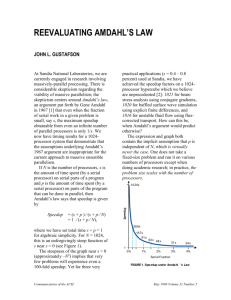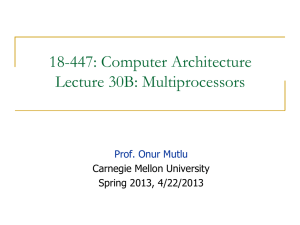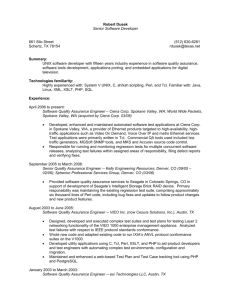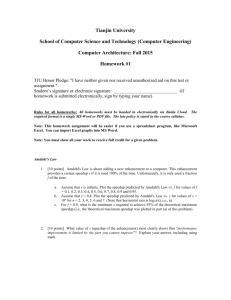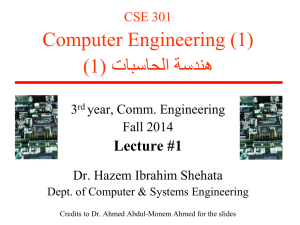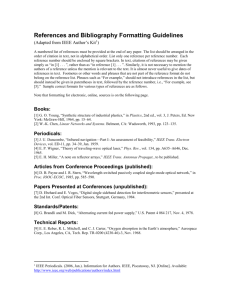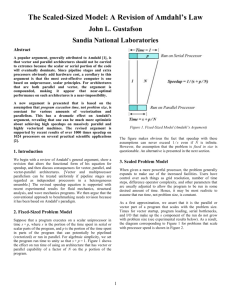Guide to the Gene M. Amdahl papers
advertisement
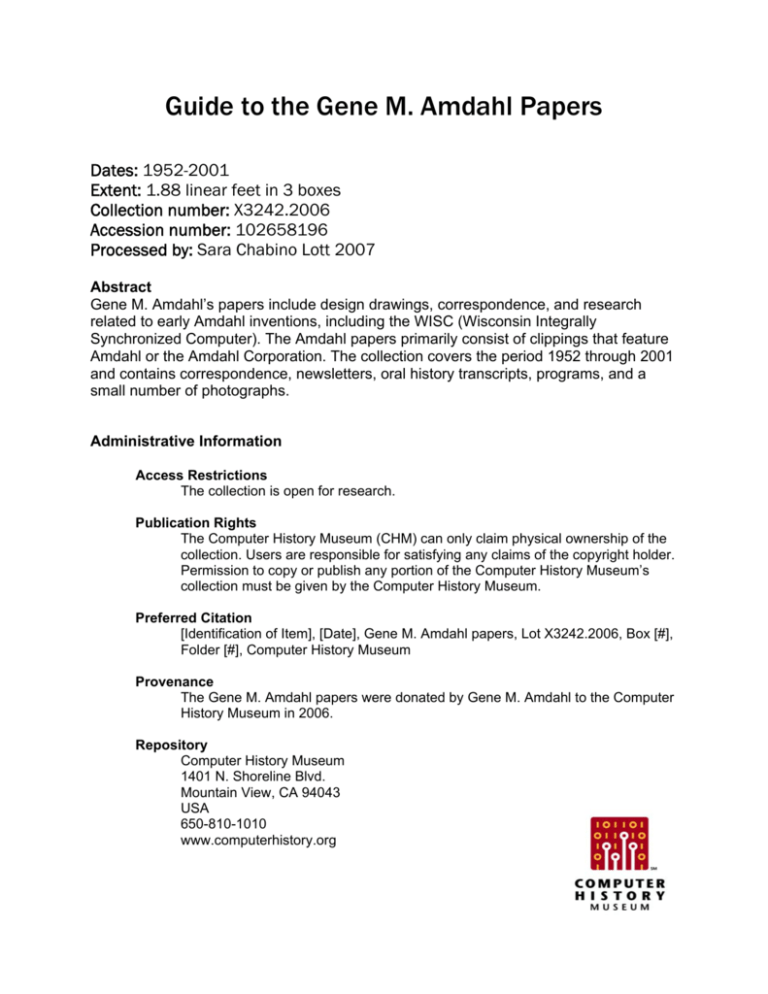
Guide to the Gene M. Amdahl Papers Dates: 1952-2001 Extent: 1.88 linear feet in 3 boxes Collection number: X3242.2006 Accession number: 102658196 Processed by: Sara Chabino Lott 2007 Abstract Gene M. Amdahl’s papers include design drawings, correspondence, and research related to early Amdahl inventions, including the WISC (Wisconsin Integrally Synchronized Computer). The Amdahl papers primarily consist of clippings that feature Amdahl or the Amdahl Corporation. The collection covers the period 1952 through 2001 and contains correspondence, newsletters, oral history transcripts, programs, and a small number of photographs. Administrative Information Access Restrictions The collection is open for research. Publication Rights The Computer History Museum (CHM) can only claim physical ownership of the collection. Users are responsible for satisfying any claims of the copyright holder. Permission to copy or publish any portion of the Computer History Museum’s collection must be given by the Computer History Museum. Preferred Citation [Identification of Item], [Date], Gene M. Amdahl papers, Lot X3242.2006, Box [#], Folder [#], Computer History Museum Provenance The Gene M. Amdahl papers were donated by Gene M. Amdahl to the Computer History Museum in 2006. Repository Computer History Museum 1401 N. Shoreline Blvd. Mountain View, CA 94043 USA 650-810-1010 www.computerhistory.org Gene M. Amdahl papers X3242.2006 Biographical Note Computer designer, author, inventor and corporate executive, Gene M. Amdahl was born on November 16, 1922 in Flaundreau, South Dakota. Amdahl married Marion D. Quissell, also from Flandreau, in 1946 and the two eventually had three children. Amdahl served two years in the U.S. Navy during World War II. Amdahl received his B.S. in Engineering Physics from South Dakota State University in 1948, and earned his Ph.D. in Theoretical Physics from the University of Wisconsin in 1952. While beginning work on his doctorate, Amdahl designed the first overlapped, electronic floating-point computer. In his doctoral thesis, he described how to build the computer he had designed. The construction of that computer took place over a period of four years by students at the University of Wisconsin and is called the WISC (Wisconsin Integrally Synchronized Computer). In June of 1952 Amdahl joined International Business Machines Corporation (IBM) in Poughkeepsie, New York. Amdahl initially worked on character recognition and intelligence simulation. In 1953 he was made chief planner and project engineer for the IBM 704 development program. Following that he did the initial planning of the IBM 709 and the IBM 7030. Amdahl left IBM at the end of 1955. In 1956 Amdahl joined Ramo Woolridge in Los Angeles, California where he prepared several military and internal proposals in the data processing field. In addition, he did the system planning for what became the RW440 process control computer. In late 1956 Amdahl joined Aeronutronic Systems Inc., a subsidiary of the Ford Motor Company. There he headed the commercial data processing department, which was responsible for electronic data entry and computer equipment. Amdahl rejoined IBM in 1960; he was director of experimental machines, manager of systems design for advanced data processing systems, manager of technology for high speed systems, director of IBM’s Advanced Computing Systems Laboratory in Menlo Park, California, and principle architect of IBM’s System 360 series of mainframe computers. Amdahl was named an IBM Fellow in 1965. Amdahl left IBM again in 1970 to form and operate his own company, Amdahl Corporation in Sunnyvale, California, for the purpose of developing, manufacturing and marketing large-scale computer systems. His plan was to compete head-to-head with IBM in the mainframe market with what became the Amdahl 470 family of computers. In 1975, Amdahl Corporation shipped its first computer, the Amdahl 470 V/6. On September 1, 1979 Amdahl resigned as Chairman of the Board of Amdahl Corporation and served as Chairman Emeritus and a consultant to the company, until he retired in August 1980. In the fall of 1980 Amdahl started another venture, Trilogy Systems Corporation, which acquired Elxsi in 1985 for its principal computer system entry. In 1989, Amdahl stepped down as chairman of Elxsi to devote more time to other ventures. In 1986, Amdahl participated in the founding of three companies of which he was Chairman, Modular Computer History Museum Page 2 of 8 Gene M. Amdahl papers X3242.2006 Power, American Industrial Group and Andor Systems International. However, by the mid-1990s all three companies were defunct. In 1996, at the age of 74, Amdahl founded Commercial Data Servers (CDS) in his continuing quest to merge mainframe technologies with the more popular PC technology. CDS changed its name to Xbridge Systems and narrowed its focus, by early 2005 Amdahl was no longer a member of their management team. In November 2004 Amdahl was appointed to the Board of Advisors of Massively Parallel Technologies. Amdahl is holder and co-holder of many patents on such developments as recognition of recorded intelligence, analog-to-digital conversion device, message display and transmission system, stored logic computer, large-scale shifter, memory protection system, storage protection and the IBM System/360. Scope and Content Note Gene M. Amdahl’s papers consist primarily of clippings that mention or feature either Amdahl or the Amdahl Corporation. There is also correspondence, research papers, numerous oral history transcripts, programs, brochures, and a small number of photographs and design drawings. This collection is organized in 6 series: Series 1. Biographical Sketches Series 2. Inventions Series 3. Correspondence Series 4. Printed Material Series 5. Ephemera Series 6. Photographs Unless otherwise noted dates are inclusive. Series 1, Biographical Sketches 1991-1995, consists primarily of transcripts of oral histories conducted by Linda Runyan as part of her contract with Amdahl to write an authorized biography of his life. Most of the interviews are with Amdahl or his wife Marion, but other associates and relatives are included. There is also a transcript of a lengthy oral history conducted by the Center for the History of Information Processing at the University of Minnesota and a copy of an unpublished biography of Amdahl. One item of note is a list of all United States patents listing Amdahl as inventor between 1964 and 1991 in box 1, folder “102680807.” This series has been maintained in its original order. Series 2, Inventions 1952-1986, is possibly the richest series in the collection. The bulk of the material is related to Amdahl’s patent application process for the Wisconsin Integrally Synchronized Computer (WISC) (1952-1954). There is correspondence with the Wisconsin Alumni Research Foundation that reveals Amdahl’s feeling that the greatest potential for a computer involving his logic lay in the field of business computation as well as his ideas for changes in the WISC that would make it more useful for business purposes. There are also copies of amendments to the patent Computer History Museum Page 3 of 8 Gene M. Amdahl papers X3242.2006 application and photostat drawings of WISC parts with hand annotated corrections. Also in this series are Amdahl’s doctoral thesis from the Dept. of Physics, University of Wisconsin, research papers circa 1956, and original preliminary designs for the Amdahl 580 (1975). This series is arranged chronologically. Series 3, Correspondence 1978-1992, primarily contains thank you letters from students attending South Dakota State University who received Amdahl endowed scholarships. Interfiled with the thank you correspondence are copies of press releases issued by SDSU announcing the recipients of Amdahl scholarships. There is a small amount of philanthropic correspondence between Amdahl and organizations he donated money to in South Dakota and California, as well as Lutheran institutions. There is a small amount of minor professional correspondence. One item of interest is a request from the Heinz Awards to Amdahl to evaluate the merits of Frederick P. Brooks in regards to his nomination for a 1998 Heinz Award. Attached to the letter is a handwritten draft of Amdahl’s favorable response. This series is arranged alphabetically by folder title. Series 4, Printed Material 1952-2001, contains clippings and monographs related to Amdahl or the Amdahl Corporation. This series is organized in 2 subseries: The first subseries, clippings, contains articles which appeared in newspapers, journals, magazines, and newsletters. They are from popular and scholarly publications and include English, French, and German language works. Amdahl kept entire issues of serials, however, during processing complete issues were kept only if they were computer related non-duplicates or especially unique, otherwise the single article was clipped. Included in this series are three Amdahl Corporation newsletters, Amdahl Update (1978, 1990, and 1999). This subseries is arranged chronologically. The second subseries, monographs, contains books which feature or mention Amdahl or the Amdahl Corporation. This subseries is arranged alphabetically by title. Series 5, Ephemera 1964-1995, primarily contains programs from ceremonies and award dinners that Amdahl either attended or was an honoree at. In addition, there is a significant amount of material related to Amdahl’s centennial alumnus award from South Dakota State University as well as material related to Amdahl’s professional visits to China as a guest lecturer. This series is arranged alphabetically by folder title. Series 6, Photographs circa 1970-1990, includes 5 photographs that were found in the original box of monographs. There are two color photographs of unidentified computer chips and three snapshots of Amdahl. This series is arranged alphabetically by folder title. Indexing Terms Amdahl, Gene M. (Gene Myron), 1922Amdahl Corporation Computer Industry—California—Santa Clara County--History Computer History Museum Page 4 of 8 Gene M. Amdahl papers X3242.2006 Computer Science—Biography Separated Material Serials that were separated from the collection because of duplication are: Computer World Vol. XXVI No. 25, June 22, 1992 IBM Systems Journal Vol. 3, No. 2-3, 1964 Monographs that were separated from the collection because of duplication are: Portraits of Success: Impressions of Silicon Valley Pioneers by Carolyn Caddes, 1986 Wizards and their Wonders: Portraits in Computing by Christopher Morgan, 1997 Portraits in Silicon by Robert Slater, 1987 The Legend of Amdahl by Jeffrey L. Rodengen, 2000 Physical objects were separated from the collection. There are 32 catalog records of various plaques, certificates, drawings, and a small number of computer hardware pieces. To view catalog records for the physical objects go to the CHM website at http://archive.computerhistory.org/search. Computer History Museum Page 5 of 8 Gene M. Amdahl papers X3242.2006 Folder List Biographical Sketches Box 1 102680807 102680808 102680809 102680810 102680811 102680812 102680813 102680814 102680815 102680816 102680819 102680820 102680818 102680817 102680821 Linda Runyon's background material for an Amdahl biography 1991 Gene Amdahl, Lars Brendsel, Wilbur Johnson, Arlene Amdahl Zeigler, 1992 Ollie Amdahl, Lowell Amdahl, Marion Amdahl, Evelyn Amdahl Olsen, Alton Amdahl Gene Amdahl, Marion Amdahl, Lowell Amdahl 1991-1992 Gene Amdahl 1992-17-03 Gene Amdahl 1992-03 Gene Amdahl, Marion Amdahl, Arlene Amdahl Ziegler, Harold Hall1991-1992 AA possibly Arlene Amadhal Zeigler 1992-05-08 Lavon Hall, Harold Hall, Lowell Amdahl, Marion Amdahl 1992 Marion Amdahl 1992-03-03 Evelyn Olson, Lowell Amdahl, Marion Amdahl 1992 Gene Amdahl, Harold Hall 1991 Interview with Gene M. Amdahl 1986-04-16-1989-04-05 Prairie Daydreamer: Gene M. Amdahl 1997-12-01 Remarks of George Bragg delivered at the Computer & 1989 ca. Communications Industry Association's award dinner honoring Amdahl History of Orin Amdahl 1995-05-08 Inventions Box 2 102680823 102680824 102680825 102680826 102680827 102680828 102680829 Doctoral thesis. Logical design of an intermediate speed digital computer Wisconsin Integrally Synchronized Computer (WISC) patent application Process While working for Aeronutronic Systems, Inc. Various computers System/360 and the high performance model 92 Design beginning for Amdahl 580 OSLO Patent - module construction for semiconductor chip 1952 1952-1954 1956 1959 ca. 1964 ca. 1975 1986-07-29 Correspondence Box 1 102680822 102680831 102680832 102680830 Philanthropic Professional associates Requests for personal papers Thank yous Computer History Museum 1978-1988 1964-1999 1986-1989 1992-1998 Page 6 of 8 Gene M. Amdahl papers X3242.2006 Printed Clippings Box 1 102680833 102680835 102680834 102680636 102680637 102680638 102680853 102680639 102680640 102680641 102680642 102680643 102680644 102680645 102680646 102680647 102680648 102680649 102680651 102680652 102680854 102680855 1952 ca.-1967 IBM Systems Journal 1967 1970, 1973 1974-1975 1976-1977 1978 1979 1980 1981 1982 1983 1984-1985 1987 1988 1989 1990 1991 1997 1998 2000 2001 1952 ca.-1964 1965-04 1967 1970, 1973 1974-1975 1976-1977 1978 1979 1980 1981 1982 1980 1984-1985 1987 1988 1989 1990 1991 1997 1998 2000 2001 Printed Monographs Box 3 102680858 102680856 102680859 102680862 102680864 A century of honors: the first one-hundred years of award winners, honorary members, past presidents, and fellows of the institute Amdahl 470/6 system machine reference manual Fortune favors the brave: Fujitsu thirty years in computers Silicon Valley fever: growth of high-technology culture Thesis and essays commemorative of Dr. Toshio Ikeda 1984 1973 1986 1984 1975 ca. Ephemera Box 1 102680867 102680865 102680868 102680866 Ceremony programs China seminars Quadrato Della Radio membership South Dakota State University Centennial Alumnus Award Computer History Museum 1964-1995 1989-1991 1980 ca. 1987 Page 7 of 8 Gene M. Amdahl papers X3242.2006 Photographs Box 1 102680869 102680870 Computer chips Gene M. Amdahl Computer History Museum 1970 ca.-1990 ca. 1970 ca.-1990 ca. Page 8 of 8
